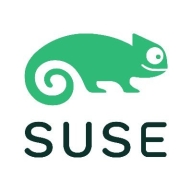

SUSE Linux Enterprise and Flatcar Container Linux target advanced infrastructure management. While SUSE offers favorable pricing and support, Flatcar might seem superior due to its streamlined features ideal for those seeking specific capabilities and cost-effectiveness.
Features: SUSE Linux Enterprise offers advanced security, scalable virtualization, and support for SAP applications, focusing on enterprise needs. Flatcar Container Linux is known for its lightweight, container-centric architecture, ideal for container deployment and management, appealing to environments needing minimal overhead and automated workflows.
Ease of Deployment and Customer Service: SUSE Linux Enterprise provides a robust deployment model with extensive support and documentation, fitting complex infrastructures. Flatcar Container Linux simplifies deployments with its immutable architecture and streamlined configuration, enhancing deployment speed and maintenance efficiency, aligning with agile technology stacks.
Pricing and ROI: SUSE Linux Enterprise offers a valuable proposition with its competitive pricing and comprehensive features, resulting in positive ROI for organizations utilizing its full capabilities. Flatcar Container Linux, with an open-source model, is attractive for minimizing initial setup costs while achieving high ROI through efficient container management.
| Product | Market Share (%) |
|---|---|
| SUSE Linux Enterprise | 5.8% |
| Flatcar Container Linux | 0.8% |
| Other | 93.4% |

| Company Size | Count |
|---|---|
| Small Business | 8 |
| Midsize Enterprise | 11 |
| Large Enterprise | 22 |
SUSE Linux Enterprise offers features like YaST for server management, seamless integration with Oracle and SAP, and a robust security setup. Renowned for stability, it efficiently supports workstations, SAP workloads, and cloud migrations across diverse industries.
SUSE Linux Enterprise is known for its lightweight design, high performance, and ease of installation. Its flexible architecture supports extensive documentation and efficient patching. The system uses the BTRFS file system for effective virtualization, and community support is significant. However, challenges include package updates causing conflicts, difficult initial setup and software management, high pricing, and support response times. Improvements in security compliance, cloud integration, hardware compatibility, and documentation are also needed.
What are SUSE Linux Enterprise's important features?
What benefits should users expect from using SUSE Linux Enterprise?
Industries like healthcare and banking use SUSE Linux Enterprise for secure transactions and structured application deployment. It is also a choice for organizations involved in testing, automation, and web development, offering support for SAP HANA integration and facilitating cloud migrations.
We monitor all Operating Systems (OS) for Business reviews to prevent fraudulent reviews and keep review quality high. We do not post reviews by company employees or direct competitors. We validate each review for authenticity via cross-reference with LinkedIn, and personal follow-up with the reviewer when necessary.